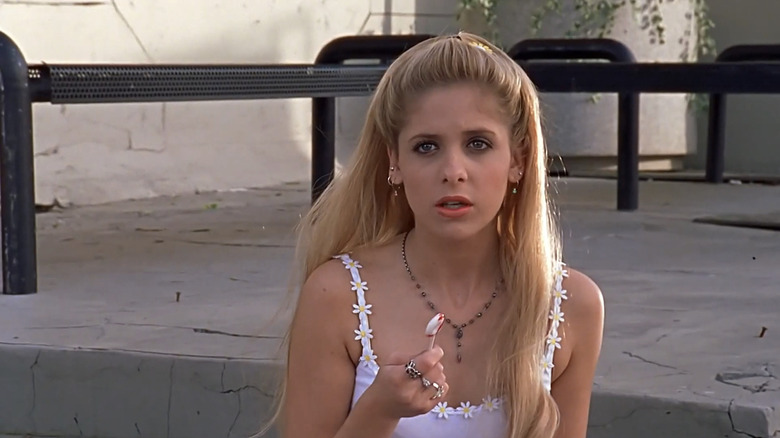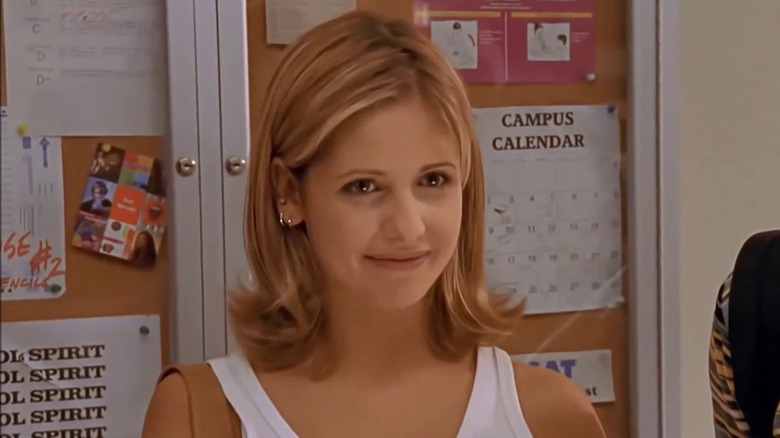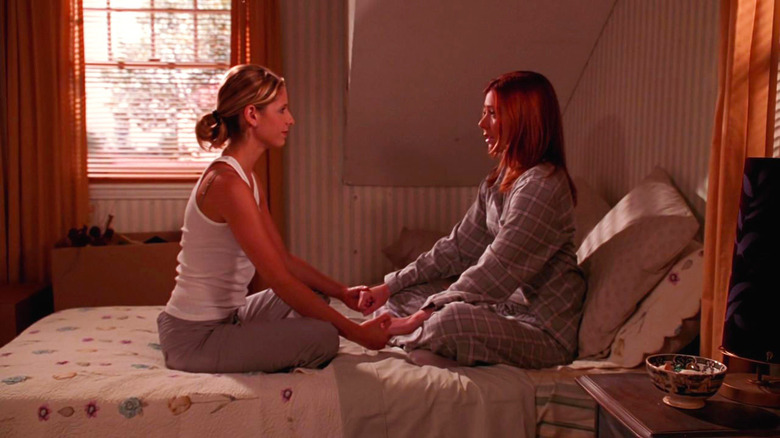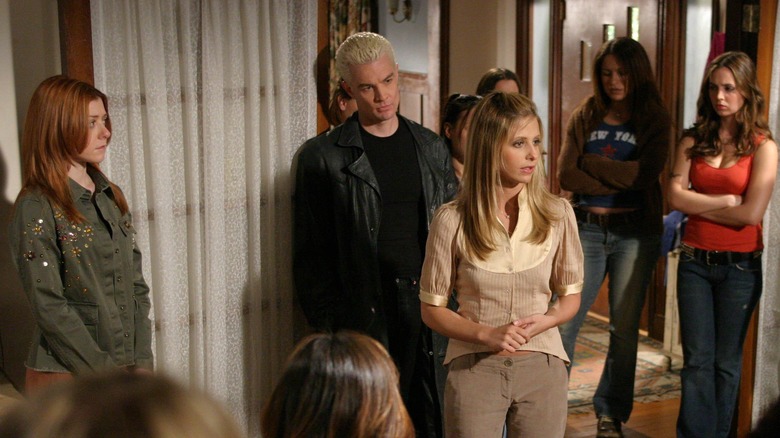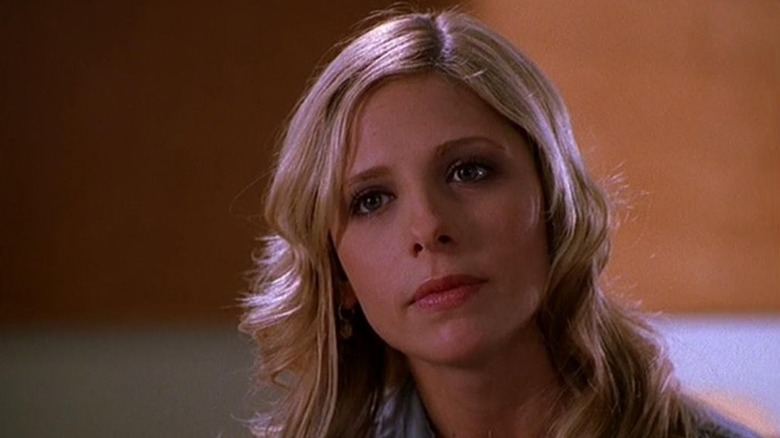Sarah Michelle Gellar Questioned The Very First Line In Her Buffy Audition
A lot of things made "Buffy the Vampire Slayer" special, from its inversion of the helpless blonde trope to its genre-defying jumps between raucous comedy, heartfelt drama, and supernatural horror. But perhaps the most lasting impact that the series had on culture was the way that it manipulated language. Problematic series creator Joss Whedon created his own particular parlance with "Buffy," and obviously the slayer herself, Sarah Michelle Gellar, speaks it like a pro. However, it might surprise fans to learn that when Gellar first auditioned for the series' lead, she was thoroughly confused by the patois that came to be known as Buffyism.
"Well, Buffyism is basically just an odd way of speaking," Whedon said in a 1998 interview. "People often quote the sort of things that people say but we don't have a lot of phrases we like to use. Basically, it's not about creating a word that all the kids are gonna go out and say, it's more about just kind of twisting the English language until it cries out in pain."
"Buffy" felt incredibly of the moment when it came out because it didn't try to emulate the dialogue of the time — it shaped it. Popular slang moves so quickly, especially among high schoolers, that any attempt to capture it as it was happening would be futile.
"The thing about creating hip fresh teen speak is that by the time you get it on the air it's over," Whedon continued. "You can't say what the teens are saying because they're not saying it anymore [...] When I wrote the movie I tried to listen to teenagers to see what they talked like and they talked like 'Heathers,' so that was useless to me. So I said oh, I'll just create a way of speaking, and if catches on then it will be what teens are saying."
Gellar didn't know what 'sitch' meant
Before Gellar became the world's most fluent speaker of Buffyism, the language felt completely foreign to her. Not only was Whedon's writing unlike anything she'd read before, it was also infused with the slang of Californian teenagers — a world that was totally alien to the East Coast born-and-bred Gellar.
"Joss has his own sort of language that's a little difficult for us mere mortals to understand," she added. "I grew up in New York we didn't have valley girls, and a lot of time, constantly I am asking him, 'What does this mean? I'm not quite sure.'"
The "Cruel Intentions" star was so unfamiliar with "valley girls," in fact, that it almost cost her the lead role. She even had trouble identifying a word in the very first line she ever read in character.
"There's a very funny story around here that revolves around the audition where the first line is, 'What's the sitch?" she continued. "And there I go walking in and my first, 'What does this mean?' No idea it meant situation, talk about blowing a job instantly."
Thankfully, Gellar didn't blow the job, of course. As it turned out, her instant understanding of the nuances of the character and her language — barring certain Californian lingo — is the very thing that got her hired in the first place. Whedon appreciated that she "found the humor" in the part while still bringing "a lot of intelligence to it, which is something Buffy needs."
"If she's just a bimbo, eventually you lose interest," he went on. "But Sarah could be as quirky and as silly as Buffy needs to be but at the same time bring real depth and intelligence to what she's going through."
Other Buffy stars were tripped up by Whedon's lingo
Now, Gellar wasn't the only "Buffy" star who almost blew their chances before getting onscreen. In true Willow fashion, Alyson Hannigan bumbled her way through her chemistry read with Gellar and co-star Nicholas Brendon — she even did a bit of unintentional slapstick comedy. After auditioning with the same scene several times, Whedon wrote a new scene for her callback that Hannigan received "the day before or the morning of" that contained "all this computer jargon" that "didn't make any sense" to the actor, she confessed to People in 2020. When she got to the part of the scene with all the technological lingo, "the words just all started swimming," Hannigan recalled.
"I don't think I was speaking English at some point," she continued. "And then finally at some point I was like 'I'm just gonna stop trying now,' and then I just looked up at them like 'Okay, save me.' And Joss later said 'You couldn't say the words to save your life, but I knew right then and there, cuz the chemistry was just there.'"
Hannigan's slip-ups made Gellar and Brendon feel instantly comfortable with her. Her future co-stars sympathized with her haplessness, much like Xander and Buffy did in the show (Buffy initially forms a friendship with Willow because she's being bullied by Cordelia). The moment that Hannigan walked into a door really sealed the deal.
"Poor Sarah, she was like, 'This poor girl!'" the actor recalled. "I remember their faces, like 'What did you just do?'"
But the biggest problem that Hannigan had with her audition was the specificity of the language, just like Gellar. So what exactly is Buffyism, and why was it so important for Whedon to invent his own way of speaking despite the challenge it presented for the actors?
How Whedon's strange upbringing influenced Buffy's dialogue
Whedon's strange twist on the English language might come from his mixed upbringing on both sides of the pond. The "Avengers" director attended a prestigious boarding school in England where he was "the token lazy American, except when it came to English class, where I was relentless and unstoppable," he once told IGN. Through British characters Giles and Spike, he was able to infuse "Buffy" with some of the British slang he heard growing up.
His love of world-famous playwright William Shakespeare extends back "as far as [Whedon] can remember." The first play he ever read was "Henry IV," but he spent the most time reading "Hamlet," which he studied for exams in school. Shakespeare is known for his clever manipulation of the English language. Rather than trying to directly copy the conversational parlance of the day or emulate the prose of other writers, he instead wrote in a unique verse and invented words like "lackluster" and "eventful" that became commonplace. These invented words were often crafted by combining existing words or turning nouns into adjectives and verbs.
Whedon, too, uses this format — in one of many examples, Xander describes Willow and her girlfriend Tara as having a "get-a-roomyness" to them in "Once More With Feeling." The show's dialogue also plays around with suffixes, and characters frequently use the phrase "slayage" to refer to Buffy's slayer duties. Some of the humor lies in the deconstruction of nonsensical words like "hootenanny" — Oz describes a party as being "chock full of hoot, just a little bit of nanny" in an episode of season 3. Whedon also gets inventive with syntax, twisting verbs into quirky phrases like "make with the fun" in the show's first season.
Buffyisms made an entire generation talk more Whedon-y
Buffyism might have presented a bit of a language barrier for the prospective stars of the series at first, but once they got comfortable with it, they really made it their own. Stylistic writing requires intelligent actors who are able to correctly interpret the moments of comedy while making their dialogue sound natural. The actors playing the Scoobies were especially skilled at this, and delivered some unforgettable lines with impeccable timing and gusto. Even the characters who spoke with a different kind of syntax, like Anya and Giles, would find themselves dipping into Whedon's verbiage every once in a while.
After deciding to invent his own way of speaking, Whedon created a tangible impact on American youth culture of the '90s and early '00s. He popularized phrases like "what's the sitch," the very line that Gellar stumbled over in her audition. In fact, the line got so popular that it was later adapted by the Disney animated series "Kim Possible," which it is now more closely associated with. But even if the world might not remember that Whedon was the one who invented this way of speaking, his impact remains the same — and that's the real wacky of it all.
